| کد مقاله | کد نشریه | سال انتشار | مقاله انگلیسی | نسخه تمام متن |
|---|---|---|---|---|
| 917070 | 919041 | 2006 | 35 صفحه PDF | دانلود رایگان |

Many authors have argued that word-learning constraints help guide a word-learner’s hypotheses as to the meaning of a newly heard word. One such class of constraints derives from the observation that word-learners of all ages prefer to map novel labels to novel objects in situations of referential ambiguity. In this paper I use eye-tracking to document the mental computations that support this word-learning strategy. Adults and preschoolers saw images of known and novel objects, and were asked to find the referent of known and novel labels. Experiment 1 shows that adults systematically reject a known distractor (e.g. brush) before mapping a novel label (e.g. “dax”) to a novel object. This is consistent with the proposal that participants worked through a Disjunctive Syllogism (i.e. Process-of-Elimination) to motivate the mapping of the novel label to the novel object. Experiment 2 shows that processing is similar for adults performing an implicit Disjunctive Syllogism (e.g. “the winner is the dax”) and an explicit Disjunctive Syllogism (e.g. “the winner is not the iron”). Experiment 3 reveals that similar processes govern preschoolers’ mapping of novel labels. Taken together, these results suggest that word-learners use Disjunctive Syllogism to motivate the mapping of novel labels to novel objects.
Journal: Cognitive Psychology - Volume 53, Issue 4, December 2006, Pages 310–344